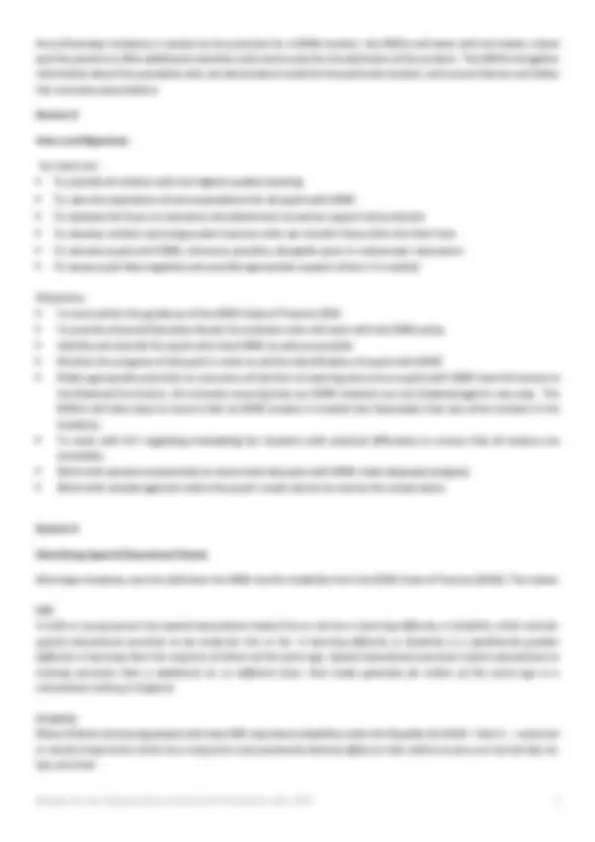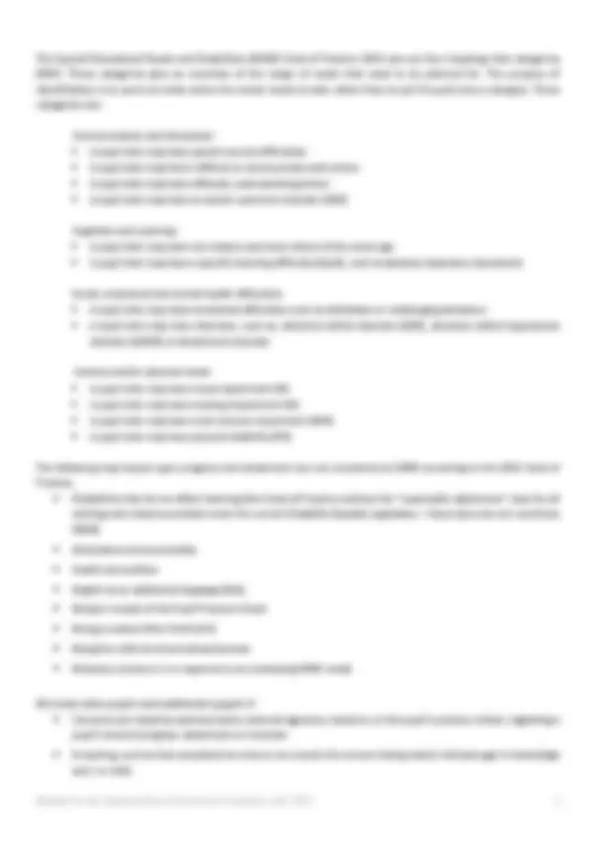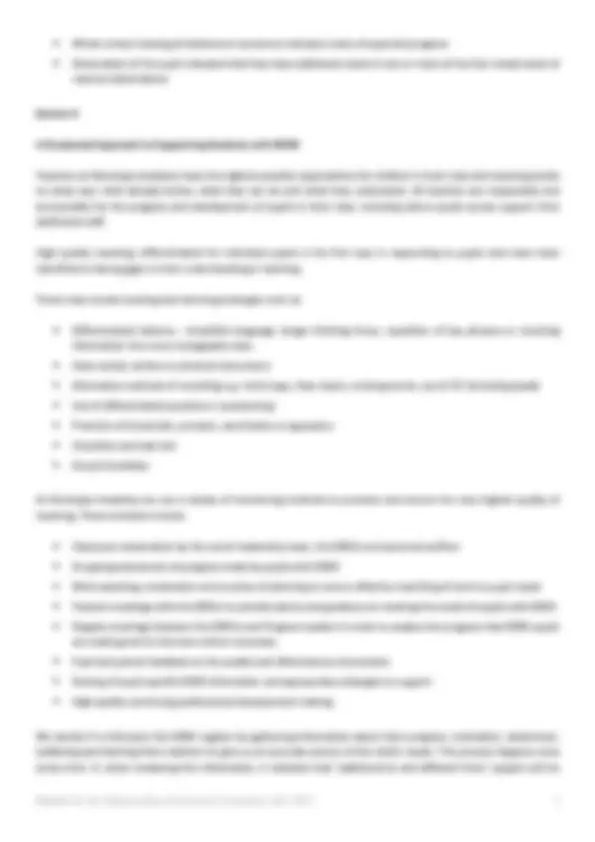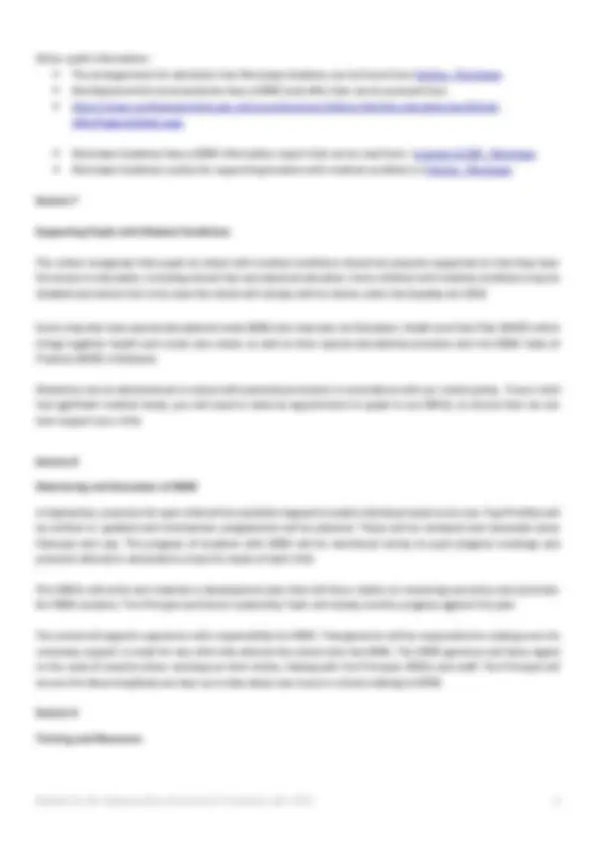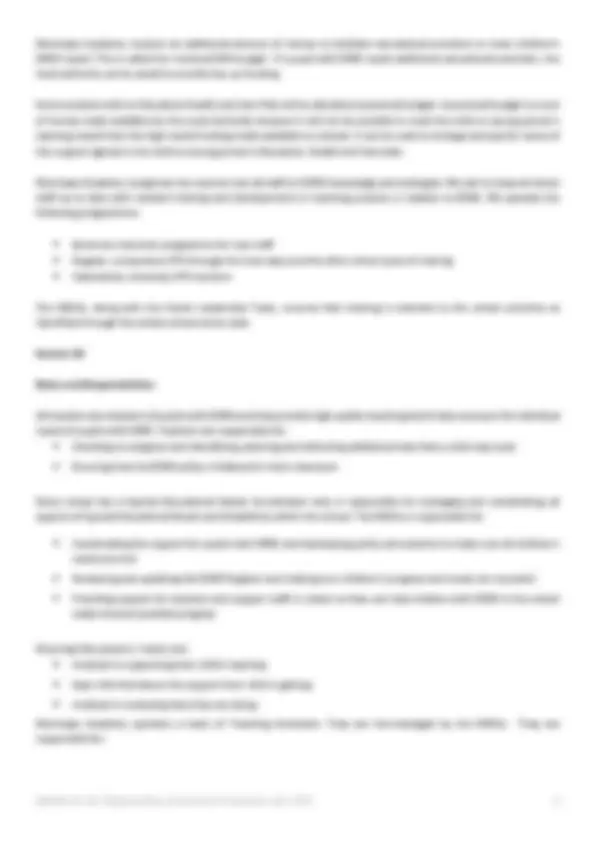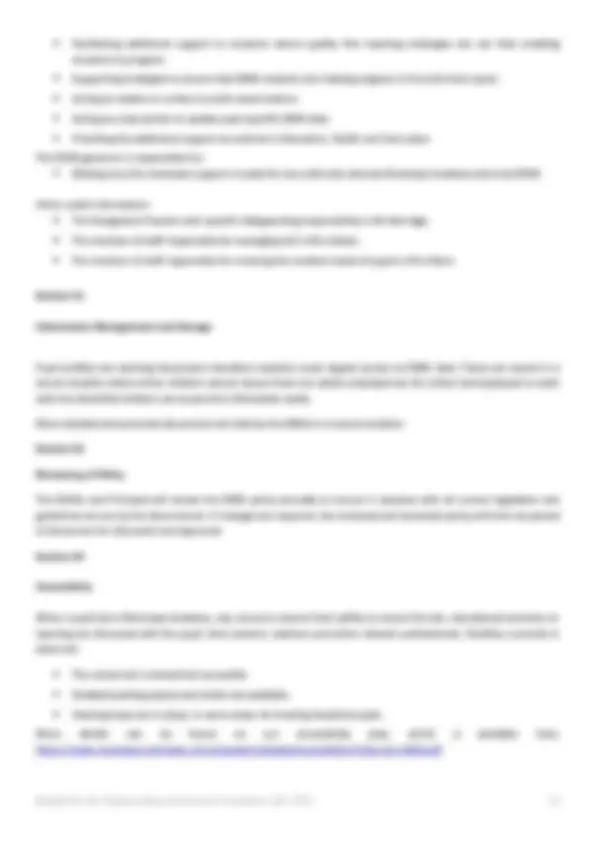Download Special Educational Needs and Disability (SEND) Policy and more Schemes and Mind Maps Communication in PDF only on Docsity!
Special Educational Needs
and Disability (SEND) Policy
Authors Rebecca Gatiss Applicable to All students and staff Ratified by Safeguarding and Inclusion Committee Valid from July 2021 Review date July 2022
Compliance This policy complies with the statutory requirement laid out in the SEND Code of Practice (2015) and has been written with reference to the following guidance and documents:
- Equality Act 2010: advice for schools DfE Feb 2013
- SEND Code of Practice 0 – 25 (2015)
- Schools SEN Information Report Regulations (2014)
- Statutory Guidance on Supporting pupils at school with medical conditions (2014)
- The National Curriculum in England Key framework document (2013)
- Montsaye Academy Safeguarding Policy (201 7 )
- National Teachers Standards (2012)
- The Children and Families Act (2014) This policy has been created by Montsaye Academy’s SENCo, SEN Governor, Senior Leadership Team and active stakeholders. Section 1 Basic Information The SENCo for Montsaye Academy is currently Mrs Rebecca Gatiss. She can be contacted via the School Office on 01536 418844. The Education Support team consists of a SENCo and the full time equivalent of 4 full time TAs. Mrs.Gatiss completed and passed the National Award for SEN in January 2014. The member of Montsaye Academy senior leadership team with responsibility for SEND is Mr.Berridge. The SEND Governor of Montsaye Academy is Angela Lloyd. Montsaye Academy is a mainstream academy and is open to students aged 11 – 18 years old. The academy is located in the Northamptonshire town of Rothwell. Many of the students that attend Montsaye Academy travel from the outlying villages within the catchment area. The school ethos is underpinned by the ‘Excellence, Resilience, Aspiration’ motto that reflects our approach to teaching and learning. We believe that every teacher is a teacher of children with SEND and that meeting the needs of all learners in our classrooms is the key to our success. At Montsaye Academy, we operate a broad and balanced curriculum that gives pupils the opportunity to flourish in life as successful individuals. The aim of this policy is to explain how Montsaye Academy makes provision for pupils with SEND, in line with the school ethos and with current legislative requirements (SEND Code of Practice 2015, Equality Act 2010). Admission Information Students with SEND will be admitted to Montsaye Academy through the usual admission procedure. If a student has an Education, Health Care Plan the Local Authority will send to consult with the Academy about the provisions which can be made. The Academy will respond in line with Local Authority timelines and the Local Authority will then liaise with the feeder school and the parent to make an informed decision about admission. This process is the same for a student with a physical or learning difficulty.
The Special Educational Needs and Disabilities (SEND) Code of Practice 2015 sets out four headings that categorise SEND. These categories give an overview of the range of needs that need to be planned for. The purpose of identification is to work out what action the school needs to take rather than to just fit pupils into a category. These categories are: Communication and Interaction
- A pupil who may have speech sounds difficulties
- A pupil who may find it difficult to communicate with others
- A pupil who may have difficulty understanding others
- A pupil who may have an autism spectrum disorder (ASD) Cognition and Learning
- A pupil who may learn at a slower pace than others of the same age
- A pupil who may have a specific learning difficulty (SpLD), such as dyslexia, dyspraxia, dyscalculia Social, emotional and mental health difficulties
- A pupil who may show emotional difficulties such as withdrawn or challenging behaviour
- A pupil who may have disorders, such as, attention deficit disorder (ADD), attention deficit hyperactive disorder (ADHD) or attachment disorder Sensory and/or physical needs
- A pupil who may have visual impairment (VI)
- A pupil who may have hearing impairment (HI)
- A pupil who may have multi-sensory impairment (MSI)
- A pupil who may have physical disability (PD) The following may impact upon progress and attainment but not considered as SEND according to the 2015 Code of Practice.
- Disabilities that do not affect learning (the Code of Practice outlines the “reasonable adjustment” duty for all settings and schools provided under the current Disability Equality Legislation – these alone do not constitute SEND)
- Attendance and punctuality
- Health and welfare
- English as an additional language (EAL)
- Being in receipt of the Pupil Premium Grant
- Being a Looked After Child (LAC)
- Being the child of a Serviceman/woman
- Behaviour (unless it is a response to an underlying SEND need) We know when pupils need additional support if:
- Concerns are raised by parents/carers, external agencies, teachers, or the pupil’s previous school, regarding a pupil’s level of progress, attainment or inclusion
- Screening, such as that completed on entry or as a result of a concern being raised, indicates gap in knowledge and / or skills
- Whole school tracking of attainment outcomes indicates a lack of expected progress
- Observation of the pupil indicates that they have additional needs in one or more of the four broad areas of need as stated above Section 4 A Graduated Approach to Supporting Students with SEND Teachers at Montsaye Academy have the highest possible expectations for children in their class and teaching builds on what your child already knows, what they can do and what they understand. All teachers are responsible and accountable for the progress and development of pupils in their class, including where pupils access support from additional staff. High quality teaching, differentiated for individual pupils is the first step in responding to pupils who have been identified as having gaps in their understanding or learning. These may include teaching and learning strategies such as:
- Differentiated delivery - simplified language, longer thinking times, repetition of key phrases or chunking information into more manageable sizes
- Clear verbal, written or pictorial instructions
- Alternative methods of recording e.g. mind maps, flow charts, missing words, use of ICT (including ipads)
- Use of differentiated questions / questioning
- Provision of visual aids, prompts, word banks or apparatus
- Checklists and task lists
- Visual timetables At Montsaye Academy we use a variety of monitoring methods to promote and ensure the very highest quality of teaching. These methods include:
- Classroom observation by the senior leadership team, the SENCo and external verifiers
- On-going assessment of progress made by pupils with SEND
- Work sampling, moderation and scrutiny of planning to ensure effective matching of work to pupil needs
- Teacher meetings with the SENCo to provide advice and guidance on meeting the needs of pupils with SEND
- Regular meetings between the SENCo and Progress Leaders in order to analyse the progress that SEND pupils are making and to intervene where necessary.
- Pupil and parent feedback on the quality and effectiveness of provision
- Sharing of pupil-specific SEND information and appropriate strategies to support
- High-quality continuing professional development training We decide if a child joins the SEND register by gathering information about their progress, motivation, attainment, wellbeing and learning from teachers to give us an accurate picture of the child's needs. This process happens once every term. If, when reviewing this information, it indicates that `additional to and different from' support will be
Section 5 Criteria for Exiting the SEND Register The SEND Register is reviewed every January and June. Depending on why the pupil was placed on the SEND Register initially, the following criteria are used to assess the appropriateness of on-going support:
- The concerns identified upon transition from previous settings are no longer evident
- Since baseline assessments, students have made progress and their attainment is now closer to age related expectations
- A pupil’s disability or difficulties no longer hinders their progress academically, socially and/or developmentally All of this is looked at in the context of the child. For example, a child may now be progressing quicker due to additional support or interventions that the school has put in place and if that support is removed, progress may slow again. All of this is done through the graduated approach and in consultation with pupils, parents and relevant professionals. If a child is removed from the SEND Register, there are whole school processes which continue to monitor their attainment and progress. These are overseen by class teachers, Progress Leaders, the Senior Leadership Team and the Principal. If a child is removed from the SEND Register, this does not automatically exclude them from any additional examination access arrangements (reader, scribe or extra time). These arrangements are managed by the SEND team according to JCQ (Joint Council for Qualifications) criteria which is updated annually. Section 6 Supporting Pupils and Families A child's education is a partnership between parents and teachers and we encourage regular communication between home and school. The progress that pupils make is shared with parents termly through progress reviews and also through the school annual reporting system / Parents' Evenings. If a child has complex needs, they may have an Education, Health and Care plan (EHCP). Parents/carers will be invited to contribute to a formal annual review to discuss their child's progress and be involved in deciding the next steps. Parents are encouraged to arrange an appointment to discuss their child's progress with their Progress Leader, subject teacher, or the SENCo. Please contact the school office who will arrange this appointment for you. The contact number is 01536 418844. Parents are also invited to open evenings, parent forums and school celebrations with regular opportunities to come into school. Some pupils are tested during Year 10 to see if they qualify for examination concessions. If the screening test indicates that a concession is likely, Montsaye Academy employ a Joint Council for Qualifications (JCQ) approved assessor to carry out additional testing. These arrangements are managed by the SEN team according to JCQ (Joint Council for Qualifications) criteria which is updated annually. We work very closely with our feeder schools to ensure that transition from primary to secondary is a smooth as possible for those children with SEND and communication takes place at several stages throughout the year. Similarly, we take measures to ensure that all students, not just those with SEND, move on to a positive destination post-18.
Other useful information:
- The arrangements for admission into Montsaye Academy can be found here Policies - Montsaye
- Northamptonshire local authority have a SEND local offer that can be accessed here
- https://www.northamptonshire.gov.uk/councilservices/children-families-education/send/local- offer/Pages/default.aspx
- Montsaye Academy have a SEND information report that can be read here: Inclusion & SEN - Montsaye
- Montsaye Academy’s policy for supporting students with medical conditions is Policies - Montsaye Section 7 Supporting Pupils with Medical Conditions The school recognises that pupils at school with medical conditions should be properly supported so that they have full access to education, including school trips and physical education. Some children with medical conditions may be disabled and where this is the case the school will comply with its duties under the Equality Act 2010. Some may also have special educational needs (SEN) and may have an Education, Health and Care Plan (EHCP) which brings together health and social care needs, as well as their special educational provision and the SEND Code of Practice (2015) is followed. Medicines can be administered in school with parental permission in accordance with our school policy. If your child has significant medical needs, you will need to make an appointment to speak to our SENCo, to discuss how we can best support your child. Section 8 Monitoring and Evaluation of SEND In September, provision for each child will be carefully mapped to enable individual needs to be met. Pupil Profiles will be written or updated and Intervention programmes will be planned. These will be reviewed and amended every February and July. The progress of students with SEND will be monitored termly at pupil progress meetings and provision altered or amended to meet the needs of each child. The SENCo will write and maintain a development plan that will focus clearly on improving outcomes and provision for SEND students. The Principal and Senior Leadership Team will closely monitor progress against this plan. The school will appoint a governor with responsibility for SEND. That governor will be responsible for making sure the necessary support is made for any child who attends the school who has SEND. The SEND governor will have regard to the code of practice when carrying out their duties, liaising with the Principal, SENCo and staff. The Principal will ensure the Governing Body are kept up to date about any issues in school relating to SEND. Section 9 Training and Resources
- Facilitating additional support to students where quality first teaching strategies are not fully enabling students to progress
- Supporting strategies to ensure that SEND students are making progress in line with their peers
- Acting as readers or scribes in public examinations
- Acting as a key worker to update pupil specific SEND data
- Providing the additional support as outlined in Education, Health and Care plans The SEND governor is responsible for:
- Making sure the necessary support is made for any child who attends Montsaye Academy who has SEND. Other useful information:
- The Designated Teacher with specific Safeguarding responsibility is Mr.Berridge.
- The member of staff responsible for managing LAC is Mrs.Gatiss.
- The member of staff responsible for meeting the medical needs of pupils is Mrs.Flynn. Section 11 Information Management and Storage Pupil profiles are working documents therefore teachers need regular access to SEND data. These are stored in a secure location where other children cannot access them but adults employed by the school and deployed to work with the identified children can access this information easily. More detailed and personal documents are held by the SENCo in a secure location. Section 12 Reviewing of Policy The SENCo and Principal will review the SEND policy annually to ensure it complies with all current legislation and guidelines set out by the Government. If changes are required, the reviewed and amended policy will then be passed to Governors for discussion and approval. Section 13 Accessibility When a pupil joins Montsaye Academy, any concerns around their ability to access the site, educational provision or learning are discussed with the pupil, their parents, teachers and other relevant professionals. Facilities currently in place are:
- The school site is wheelchair accessible
- Disabled parking spaces and toilets are available.
- Hearing loops are in place, in some areas, for hearing impaired pupils. More details can be found on our accessibility plan, which is available here: https://www.montsaye.northants.sch.uk/assets/Uploads/Accessibility-Policy-Jun-2018.pdf
All children, if required, can have access to a variety of resources such as pen/pencil grips, coloured overlays, highlighters and visual prompts on desks and classroom walls. Additional aids such as writing slopes and spellcheckers are available as necessary. Alternative forms of recording are encouraged such as mind maps, oral presentations and the use of ICT (including iPads). Individual needs can be discussed with the class teacher or SENCo. If needed, we ask various outside agencies to help with assessing the needs of pupils to ensure they are able to access the school and learning to the best of their ability. Advice from Occupational Therapists, Physiotherapists, Health and Safety personnel at County Hall alongside the Specialist Teaching Service is sought to enable this to happen. Section 14 Dealing with Complaints The SENCo, class teacher, Principal and SEND Governor can be contacted to discuss any concerns that you have as a parent / carer. Wherever possible, we seek to discuss with parents and come to an agreement about children's education. The school's complaints policy is available here: https://www.montsaye.northants.sch.uk/assets/Uploads/Complaints-Policy-link-document.pdf Section 15 Bullying As an education provider we take the steps to minimise the risk of bullying of vulnerable learners within our school. The Principal and Senior Leadership Team supported by a behaviour team oversee the school’s anti-bullying policy and are responsible for ensuring that it is implemented effectively throughout the school. The safeguarding and well-being of all pupils within the school is the upmost priority of all staff. A copy of the school anti-bullying policy is available on request. A copy of the school safeguarding policy can be found here: https://www.montsaye.northants.sch.uk/assets/Uploads/Safeguarding-Policy-2020.pdf

